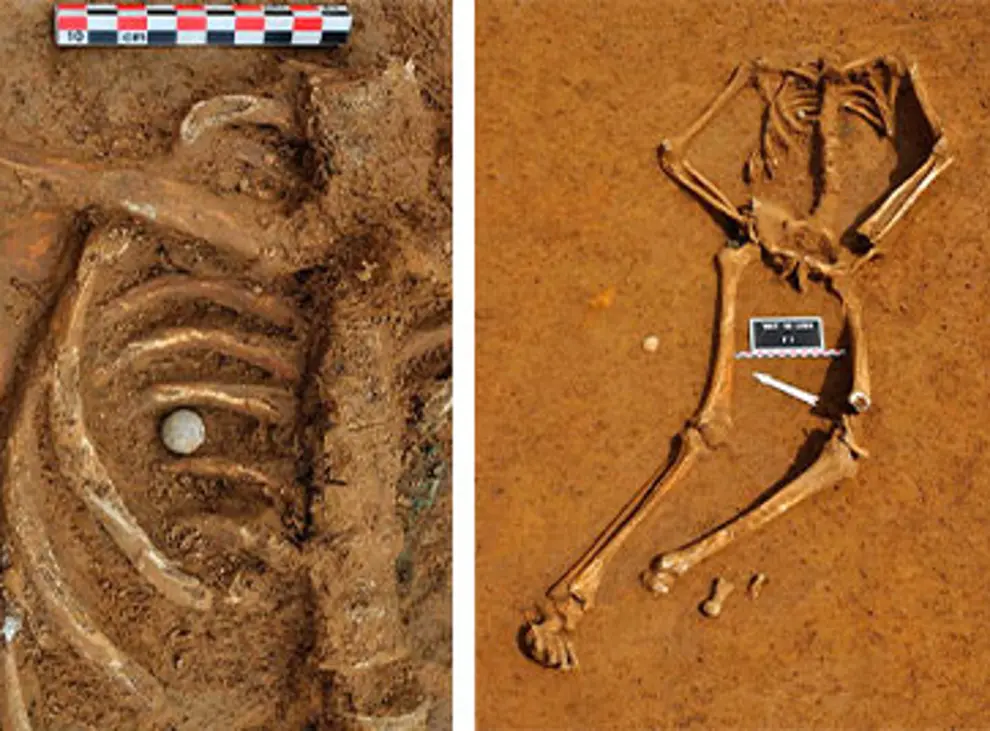Taková nedotřená kostra........ 
23 Apr 2012 Skeleton of a soldier from the Battle of Waterloo
Categories: Calendar
A great discovery was made by Belgian archaeologists ten years ago. They discovered the skeleton of a soldier from the Battle of Waterloo. It was rare because it was left untouched. In addition, the grave contained all the soldier's personal possessions.
The Battle of Waterloo took place on 18 June 1815, about 20 kilometres south of Brussels. Napoleon was defeated in this battle, although he was a brilliant warrior. His defeat was due to the correct timing of this battle. Immediately after the battle, there were swarms of looters. They turned over the dead to search their pockets. They even took the rings from their hands and tore the chains from their necks.
Lieutenant Emanuel Biedermann of the 2nd Light Battalion KGL wrote about this disgusting spectacle directly in his memoirs. He described how already on the march they met a large number of peasants who had returned from the battlefield carrying all sorts of equipment.
"Some had wool blankets, riding coats, harnesses, others had weapons and other tools in their collection. Many were now going there with wagons to collect some scraps. We did not begrudge them this harvest as a small compensation for the devastation of the two armies of cornfields far and wide," Biedermann wrote.
But in 2012, Belgian archaeologists discovered the skeleton of a soldier that was intact, and even had the man's personal belongings buried with him. According to the experts, perhaps even all of them should have been with him, which is already a real rarity considering the looting mentioned.
Archaeologists have revealed that the soldier was English. The body remained intact in the ground for almost 200 years. Archaeologist Dominique Bosquet commented on the discovery. He said the soldier's teeth were even seen to be distorted. "He probably damaged them as he opened a wrapped cartridge of gunpowder," the archaeologist noted.
After the archaeologists carefully pulled the skeleton out of the ground, they set about a detailed examination at their workplace. They found that the soldier appeared to have died after being hit in the chest. "The body apparently remained in the position in which the soldier found death. He died after being hit by a bullet. You have to imagine a soldier who was hit in the chest retreating from the front line and falling to the ground about a hundred meters behind the front line and dying," Bosquet added.
As for personal items, archaeologists have discovered coins in the dirt that the soldier had in his pockets as well as military equipment. The field bottle was engraved with the owner's initials, namely C.B. Archaeologists were excited about the find because the last time a soldier's body was found on the former battlefield was in 1912.
Sources: www.dotek.cz, Dag Heward-Mills: The Good General, www.ceskatelevize, www.independent.co.uk

The article is included in categories:
Post
Dneska jsem tak zblblej, že jsem chvíli hledal výraz nedotřená kostra (myslel jsem že je to archeo hantec), až po chvíli mně to došlo  Jde to se mnou z kopce.
Jde to se mnou z kopce. 
Ale jooo, ale člověk čte celej zaujatého tučný text hned pod nadpisem a tam se ten překlep zrovna fakt nehodí. 😁😁😁😁 Ale rozesmál mě 

Nedotčík 


 no,co vím,tak ve vedlejší dědině je hospoda -U angličanovy hlavy.
no,co vím,tak ve vedlejší dědině je hospoda -U angličanovy hlavy. 
Přesně - na snímku nemá hlavu, ale v textu je:
Objev komentoval archeolog Dominique Bosquet. Uvedl, že bylo dokonce vidět, jak má voják narušené zuby. „Zřejmě si je poškodil, jak otevíral zabalenou dávku se střelným prachem,“ poznamenal archeolog.
Tak někde ta hlava bude...asi v tý hospodě. 
Tak,tak.Policisté onehdy našli kostru,zavolali doktora a ten jim řekl,že je to Favorit. 












